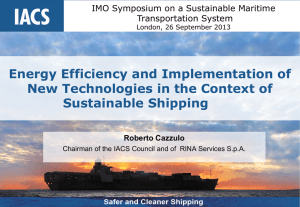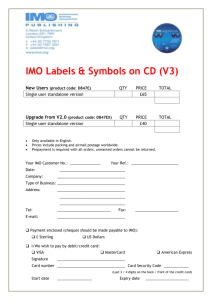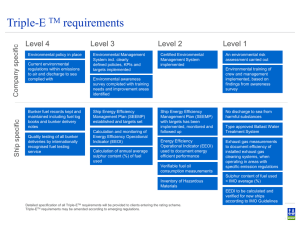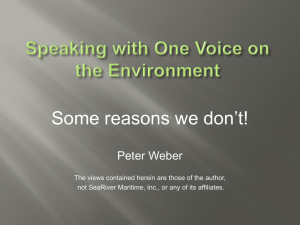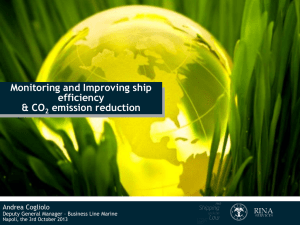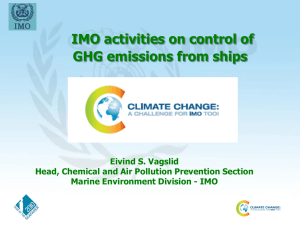GHG Emissions From Ships Operational Efficiency
advertisement
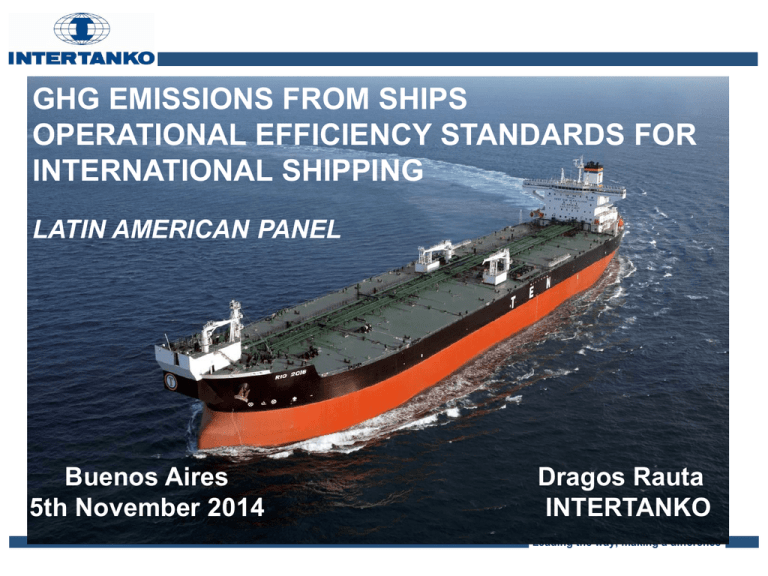
GHG EMISSIONS FROM SHIPS OPERATIONAL EFFICIENCY STANDARDS FOR INTERNATIONAL SHIPPING LATIN AMERICAN PANEL Buenos Aires 5th November 2014 Dragos Rauta INTERTANKO Leading the way; making a difference BACKGROUND Climate Change/GHG Emissions – HIGH level political item Kyoto Protocol – Regulatory frame work through UNFCCC – Parties commit to emissions reductions targets: • primarily through national measures . . . . . . but also • through additional Market Based Measures (MBMs) Due to their international character, Aviation & Shipping not included in the Kyoto Protocol UNFCCC agreed measures are taken through ICAO and IMO, respectively ICAO decision: to suggest an Emission Trading Scheme (ETS) for aviation by 2016 with enforcement in 2020 Leading the way; making a difference IMO Decisions • Mandatory Energy Efficiency Design Index (EEDI) for new buildings (1 January 2013) & Ship Energy Efficiency Management Plan (SEEMP) for all ships • SEEMP does not set a target for GHG emissions reduction of ship in operations • IMO considered Market Based Measures (MBMs) for shipping but thus far, no agreement • Alternative: Amendments to MARPOL Annex VI to assess Energy Efficiency of ships in operation Leading the way; making a difference OPERATIONAL EFFICIENCY STANDARDS FOR INTERNATIONAL SHIPPING WHAT DOES IT MEAN? IN PRINCIPLE, SHIPS IN OPERATIONS WOULD BE EXPECTED TO MEET A LEGALLY – BINDING OPERATIONAL EFFICIENCY OR LIMIT SHIPS’ ANNUAL FUEL CONSUMPTION KEEP IN MIND: THIS IS JUST A PROPOSAL Leading the way; making a difference OPERATIONAL EFFICIENCY STANDARDS The Concept: Three step phase-in legislation • Phase I – data monitoring, reporting and verification • Phase II – trial period for verification of enforceability of the set target • Phase III – enforcement The Proposals: @ IMO by: USA, Japan, Germany and EU (item called: further technical and operational measures for enhancing energy efficiency of int. shipping) Regional: European Commission (proposed regulation called Monitoring, Reporting and Verification (MRV)) Leading the way; making a difference PROPOSED SCHEMES at IMO USA - Ship Efficiency Credit Trading (SECT) Data to be used: (a) joules of energy of fuel used & (b) ships’ service hours Measure: Efficiency measured on joules/service hours; Target: to be defined Japan - Annual Efficiency Ratio (AER) Data to be reported: (a) fuel consumption & (b) distance Measure: Annual AER value calculated with a “standard cargo” (vessel’s max. DWT) AER = total (annual) fuel consumption / total (annual) distance / DWT Target: to be defined Germany - Fuel Oil Reduction Strategy (FORS) Data to be used: (a) installed power (b) average SFOC (c) average annual operational time & (d) average annual cargo carried. Measure: Reference Fuel Consumption for a ship type and size: RFC = (Installed Power) x (~ SFOC) x (~ operational time) x (~ cargo carried) Target: Standard required = RFC x (1 – Reduction Target in %) reduction target in% yet to be defined What if not compliant? not addressed by any of the proposals Leading the way; making a difference CURRENT SITUATION @ IMO • No agreement for the development of an operational efficiency model for ships • This will be discussed at a later stage, after assessing the data collected • Continue to work on a draft text for a mandatory data collection • The further work to be done by a correspondence group (CG) Leading the way; making a difference CURRENT SITUATION @ IMO • Data collection from ships of > [5,000] DWT • Data which could be collected: – identify the ship (name of the ship, IMO number, flag State and registered owner) – provide technical characteristics of the ship (ship type, GT, NT, DWT, engine power, reference/design speed, EEDI (if applicable) and ice class (if applicable)) – provide total annual fuel consumption per fuel type • Agreed to not include any other data such as total distance travelled, total service hours and total cargo carried over one year • A decision on this type of data to be taken after IMO/MEPC has had a full policy debate in order to explore possible consensus of any additional measures except fuel consumption data reporting Leading the way; making a difference CURRENT SITUATION @ IMO • Data reported to a centralised database managed and paid for by IMO • Reporting system to be established by the Flag • Annual Report in electronic format • Definition of the “annual reporting period” to be developed by the CG • Ships maintain annual reports onboard and make it available to their Flag, if requested • CG will not discuss whether data should be made public; this will be discussed further by MEPC at a later stage Leading the way; making a difference Industry Submission @ MEPC 67 • Agreeing with data collection • Challenging the need, the justification and the feasibility of a legally-binding operational efficiency for ships • Fuel efficiency standards for entire transportation sectors applied at design stage; IMO adopted EEDI • No other transportation sector subjected to operational efficiency standards • Operational efficiency standards account for many and complex criteria: not practical as a regulatory standard • Costs of fuels, costs for compliance with ECA and global S cap are great incentives for fuel emissions reductions • List of key questions IMO should answer before deciding Leading the way; making a difference EU REGIONAL PROPOSAL on MRV Applicability: All ships > 5,000 GRT calling to EU ports Reporting CO2 emissions when ships travel: • between EU ports, • an incoming voyage from a non-EU to an EU port • an outgoing voyage from an EU port to a non-EU port Data to be reported: fuel consumption, distance and cargo Reporting in accordance with a Ship’s Monitoring Plan Measure: monitor the ship’s average energy efficiency at least with the following criteria: Total annual CO2 emissions / total annual distance travelled Total annual CO2 emissions / total annual transport work Leading the way; making a difference EU REGIONAL PROPOSAL on MRV Proposed Dates for implementation: 1 July 2015 – enter into force 31 August 2017 – companies submit Monitoring Plan to “verifiers” 1 January 2018 – starts first annual reporting period 2019 and after – by 30 April each year, companies shall submit a verified emissions report to the European Commission and to the flag State – by 30 June each year, the European Commission will make the emissions reported by ships publicly available EU Commission, EU Parliament and EU Council initiated the trialogue negotiations on 15 October The proposed MRV regulation could be ready for adoption for July 2015 but . . . . . . . mostly on data collection Leading the way; making a difference INTERTANKO COMMENTS ON MRV • MRV should be discussed at IMO - Regional MRV will bring marginal benefit (shipping contribution to total GHG in EU < 0.50%) • Regulators must consider thoroughly data collected and assessment results before taking next step • There is no model to define a fair and concrete legal binding operational standard for ships • No problems with some data collection (aggregate annual values) • Simplicity in data collection • Verifiers to be licensed and have shipping experience Leading the way; making a difference TANKERS PERFORMANCE Average improvements from the EEDI base line (new ships) VLCCs 11.05% Suezmax 15.82% Aframax 13.25% MR 0.00% 19.45% 5.00% 10.00% 15.00% 20.00% 25.00% Source: IMO – MEPC 67/INF:4 Leading the way; making a difference SEEMP RESULTS 12.00 Cargo EEOI 11.00 10.00 9.97 8.98 9.00 8.42 8.83 7.99 8.00 7.00 6.00 2007 2008 Yearly improvement (index 2007) 9.86% 2009 15.50% 2010 11.40% 2011 19.80% Leading the way; making a difference INT. SHIPPING CONTRIBUTIONS TO GLOBAL CO2 Ships reduce GHG emissions at a higher rate than land 3.50% 2.90% 3.00% 2.50% 2.70% 2.40% 2.80% 2.30% 2.00% 2.20% 1.50% 1.00% 0.50% 0.00% 2007 2008 2009 2010 2011 2012 Source: IMO 3rd GHG Study (2014) Leading the way; making a difference ACTUAL FUEL CONSUMPTIONS ON SISTER SHIPS Ships can report annual aggregate fuel consumptions and aggregate values of some few other relevant transportation data Naïve to believe it is realistic to establish fair and efficient legally-binding, fleetwide operational efficiency standards Leading the way; making a difference muchas gracias dragos.rauta@intertanko.com Leading the way; making a difference
